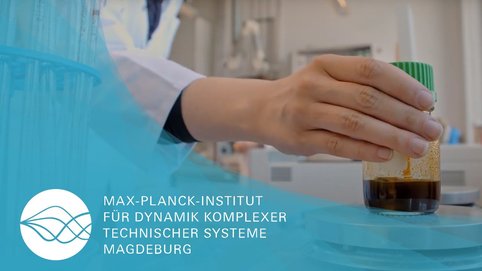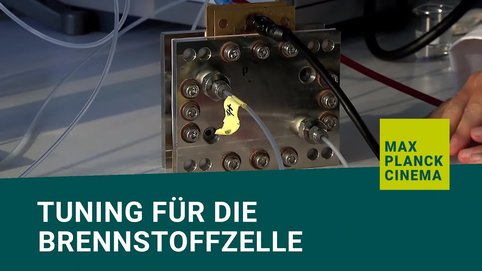MPI research explained
Max-DePoly: Energy-efficient recycling of polyamides
Polyamide are tough materials with high strength, are processed into synthetic fibers and have recently been increasingly used for lightweight components in automotive engineering and electronics. Total production is increasing sharply worldwide. An energy-saving chemical recycling process for polyamide would enable a sustainable circular economy and reduce the need for fossil raw materials. To do this, it must be possible to recover pure monomers from industrial synthetic fibers. A team of scientists at the Max Planck Institute in Magdeburg is currently setting up this process on a laboratory scale.
https://www.youtube.com/watch?v=SfSxub3i9XQ
Eversyn: For broader use of bioactive sugars for nutrition and biopharma
Eversyn, a Start-up venture of the MPI Magdeburg, owns the novel technology for the inexpensive and highly scalable synthesis of nucleotide sugars and oligosaccharides.
https://www.youtube.com/watch?v=NkHN0CYGB2g
Lignin: Development of a process for optimal purification and analysis (available in German)
Driving with straw, building with nutshells - this is possible with fuels, chemicals or building materials that are sustainably produced from biomass. They are obtained from residues and waste products from forestry and agriculture, such as residual wood, straw or nut shells. In addition to sugar, lignin in particular is an essential component of these residues and is of great economic interest. The scientists at the Max Planck Institute Magdeburg therefore want to process the lignin to such an extent that it can be used as building blocks for high-quality bio-based materials such as bio-polymers, insulating foams (polyurethane) and bitumen. To this end, they are developing efficient processing processes for refining and classifying lignin fractions, initially on a laboratory scale and later on a pilot plant scale.
https://www.youtube.com/watch?v=Z9GZTOnRI9o
Biorefineries: Solvent design for efficient biomass fractionation (available in German)
Renewable raw materials, produced in agriculture and forestry, form the basis for a sustainable circular economy. However, the amount of raw materials available is limited by factors such as the area under cultivation. Therefore, the existing material must be used optimally and as efficiently as possible. To do this, the biomass is broken down into its basic components, also known as biomass fractionation. Scientists at the Max Planck Institute Magdeburg are searching for green solvents and, thanks to computer-aided quantum mechanical calculations, are able to design their own ways for biomass fractionation.
https://www.youtube.com/watch?v=TMxajGoXtqE
Selective Crystallization (available in German)
Crystallization processes are applied for manufacturing of commodities (e.g. inorganic salts) and fine chemicals, as pharmaceuticals, food and agrochemicals. Scientists at the Max Planck Institute Magdeburg explain their research on crystallization processes.
https://www.youtube.com/watch?v=G3RVruFPnZY
ContiVir: Efficient Virus Production Technologies for Quick and Scalable Vaccine Manufacturing
How can vaccines be produced faster to respond to new emerging diseases? Gene therapies have shown the promise to become the next medical revolution for combating a wide variety of currently untreatable diseases. The ContiVir project focuses on the development of a continuous manufacturing platform for commercially relevant viral gene therapy vectors.
https://www.youtube.com/watch?v=NqIiSyqd_-k
Green Process Engineering: Production of Malaria Medication (available in German)
The production process of the best therapy agent so far against Malaria, artemisinin, is optimized by engineers at the Max Planck Institute Magdeburg.
https://www.youtube.com/watch?v=5tNEDZDZq-s
Algae biorefinery: Complete Use of Algae Biomass (available in German)
Green microalgae are real all-rounders. Scientists at the Max Planck Institute Magdeburg show how we can make better use of their compounds.
https://www.youtube.com/watch?v=Ax2s-U_QzuY
Analysis and Redesign of Biological Networks: Producing Chemicals with Bacteria (available in German)
Microbial Cell Factories: Scientists at the Max Planck Institute Magdeburg explain how they gain a better understanding of microorganisms and their tailor-made optimization.
https://www.youtube.com/watch?v=0-Z6UZSryXY
Tuning for fuel cell
The fuel cell can generate climate-friendly electricity, especially if it is operated with hydrogen from regenerative sources such as biomass. So that it also works optimally with fuel from wood waste or straw, it needs a sophisticated control system. A film by the Max Planck Society explains the research work involved.
https://www.youtube.com/watch?v=lDEtMThhGpc









